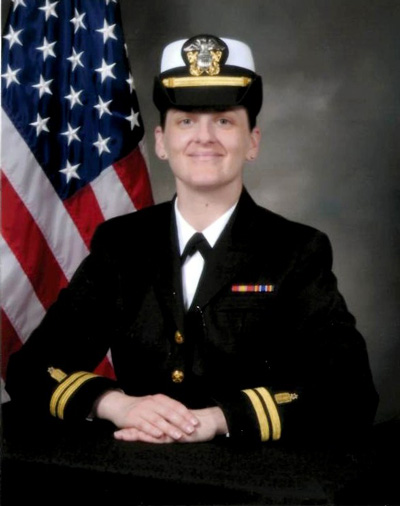Changing course
Permanent link All Posts
Chaplain Lt. Emily Rosenzweig
Lieutenant Emily Rosenzweig knew she wanted to be a rabbi from a young age growing up in Mount Vernon, N.Y.
After her rabbinical ordination, she headed out to Columbus, Oh., where she served as an assistant rabbi and director of education at a Reform congregation for five years.
As much as she loved the congregants, she felt like the business of what it takes to run a modern synagogue consumed her time. Her world grew smaller, and she felt isolated from the non-Jewish world that she had always connected to in the past.
She was yearning for something different—but she didn’t quite know what. Then, a series of events in her life converged, leading her to change her course.
First, she was paying close attention to the war abroad. “All the news coming out of Iraq and Afghanistan, as well as the news on the home front about what war was doing to our men and women, tugged at my soul,” she said.
Around that time, she saw a TV movie called Taking Chance, based on a true story. Rabbi Rosenzweig related to the main character, a Marine Corps officer, played by Kevin Bacon, who felt unfulfilled pushing papers back home so he accompanies the body of a fallen marine home for burial.
At the same time, Rosenzweig noticed a blurb in a Jewish newsletter with a call out for new Jewish chaplains.
So she answered the call and joined the military—choosing the U.S. Navy.
When she joined, she was asked how she’d feel about taking orders. “Taking orders from people? I worked with the [synagogue’s] sisterhood so that’s no problem,” joked Rosenzweig, who resides in Evanston with her husband.
And with that, she was on her way. In 2012, she completed basic training in Rhode Island followed by Navy chaplaincy training in South Carolina.
The chaplains she trained with represented 12 branches of various religions, 20 people total, including three women. Rosenzweig says although she recognizes a different leadership style exhibited by male versus female colleagues—similar to the differences she saw between the genders in the rabbinate—she has felt very little gender discrimination as a chaplain.
In April of 2012, she was stationed at Naval Station Great Lakes, the U.S. Navy’s only boot camp, located in North Chicago. There are some 300 Jewish recruits at Great Lakes, out of approximately 36,000 total recruits.
A chaplain’s chief role centers around caring for the recruits. She or he focuses less on the daily activities of the military, and more on the spiritual needs and comfort of the men and women serving in uniform.
The challenge lies in meeting the spiritual needs of all recruits—no matter what religion they identify with. How do you make the spiritual component universal enough that everyone feels their spiritual needs are met, but particular enough that the person delivering the prayer is comfortable with it?
No matter what one believes, comfort is a universal concept. “I can’t pretend to be the Muslim chaplain because I’m not a Muslim chaplain,” Rosenzweig said. “I’m the Jewish chaplain who can speak with a Muslim sailor about the death of a loved one because compassion is compassion is compassion.”
Rabbi David Bauman, an Orthodox rabbi, is the only other Jewish chaplain stationed at Great Lakes. He and Rosenzweig work closely with one another and offer options for two different religious services, coordinated by the Chicago Board of Rabbis, out of the same space, and they chant from the same prayer book.
Rosenzweig’s tour at Great Lakes ends in July; up next, she’ll be stationed in Hawaii, where she’ll work with a marine battalion.
She wants to dispel the myth that Jews don’t serve in the military. In fact, 1 percent of the U.S. armed forces is Jewish, some practicing Jews, while others not. “Jews have served in every major conflict in American history,” she said. “The history of Jews in the military is as long as the military.”
Her true callings she says, is to share the lessons of the Torah—whether it’s to congregants from a pulpit or to sailors in need of spiritual sustenance. “To see somebody find meaning or relevance in the Jewish tradition, whether or not it’s their tradition,” she said, “is what I was meant to do.”



.jpg)



